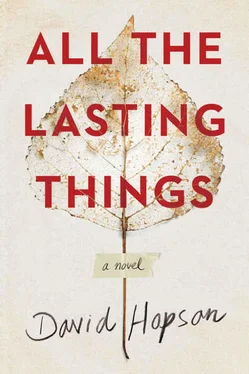“Honeybear,” she said.
Jane? Yes. Marry me. I’ll never marry you. Why not? I’ll never marry anyone. Never is a very long time. What do you want to get married for anyway? To dominate and oppress you, naturally. Forever? Forever. Forever is a very long time, but since you put it that way, fine, yes, I’ll marry you. Say it then. I just did. Say it again. Is this the beginning of my oppression? Say when, when will you marry me? Tomorrow. You always say tomorrow. And I mean it, but then we wake up, and tomorrow’s always today. There are words for girls like you. It’s true, and I’ll bet you know every one.
It rose before her eyes like a city bearing her name. A vibrant, bustling hub stood at the center, the dense central ring of pedestrian-friendly shops, the drugstore, two restaurants, a community center, a nondenominational meeting house, a playground and swimming pool and gymnasium, from which lines of row houses — livably but not intimidatingly modern — extended outward like the spokes of a wheel. Alluvia had never seen the likes. Claudia imagined the streets humming and alive, neighbors strolling at dusk under the soft lamplight, gathering for concerts on the distant green. The dream cradled her for a moment, shielding her from the angry summer sun, from the irritants of the real bustling crowd building up around her, before the screech of a hot mike grabbed her by the shoulders and shook her hard. She came to in the middle of the desolate field. A thick of dark, bark-stripped trees standing where the village center one day would. A pond in place of her pool. She slapped a mosquito about to land on her neck.
The field at Compton’s Mound, surrounded by slumbering backhoes and bulldozers, remained (for the moment) untouched. Nick might have set their heavy jaws in motion long ago, but Goliath of area business though he was, the slightest breeze of negative publicity threatened to topple him faster than David’s slingshot. The only indication of the changes to come were the dozen large-scale renderings that stood on easels lining the front of the modest stage. Claudia stood before one of them, holding out her smartphone for a photo she’d been too distracted to snap. She hit the shutter and, with a few efficient stabs at the smooth glass screen, sped the image off to Max. Wish you were here . Cat stood a few feet away.
“Thank you,” she said.
“For what?”
“For leaving the cemetery where it is.”
Cat, who, to Claudia and Nick’s great relief, had surrendered her incendiary Save Compton’s Mound T-shirt in order to cross enemy lines and participate in the groundbreaking ceremony, lifted her sunglasses to study a rendering of the cemetery. Its shattered graves, enclosed by a refurbished iron fence, gathered around a new marble obelisk, carved with the names of the ancient veterans whose commemoration Cat and her not-always-merry band of protesters had fought so hard to secure.
“I’m glad you’re saying a few words,” Claudia responded.
“I’m not sure how I feel about the pet cemetery.” She looped her arm through Claudia’s — lightly, briefly; it was too hot for skin-to-skin — and strolled along to the next set of posters. “But I’ll keep that to myself. It’s the idea of sharing space with the neighbor’s corgi. It doesn’t exactly say sacred ground.”
There’s no such thing, Claudia thought. By this time, after all the spinning the earth had done, there were bones under every last boot sole. The only option for building, for walking, for moving on was to do so on top of them.
“Nick thought the owners might be less creeped out. You know, by the dead in their backyards.”
“Compromise.”
“Compromise.”
Claudia’s decision to leave the scraggly little gravesites more or less alone had as much to do with Nick’s directives as it did with her budding affection for Benji’s future wife. If he asked her, that is. If she said yes. But these things, to Claudia, seemed as inevitable as Benji putting his ducks in a row and asking his sister for help buying the ring.
A month ago, Cat and her sister, Molly, made their annual pilgrimage to the Iowan field where, twenty-four years earlier, American Flight 782 crashed to the ground. There was no finely etched slab to memorialize their parents’ names. A couple who, like the 182 others who died that day, had no claim on the land, no say in whether nature would be allowed to erase so completely the tragic end of their tale. In time, the scarred earth did exactly that, reverting back to a lush, silky green sea of corn. If it weren’t for the kindness of a sympathetic farmer, who set a giant white boulder in the nearby clearing behind his barn, the site would have gone completely unmarked. No place for the mourners to go. Nowhere to point to and say, There. It happened there .
When Cat was a girl, in the first years after the accident, she traveled to Mason City with her aunt and uncle, who provided the three McCarthy children with bouquets of daisies to lay among the carpeting flowers, the plush animals, the candles. Each year, the number of visitors diminished. Each year, the number of offerings thinned. The story worked on Claudia’s sympathies, which seemed so much more workable these days. You’re like a brick, Benji observed, that’s turning back to clay.
The insult — who wanted to be called a brick or, for that matter, clay? — infuriated her, but the truth was she had so few girlfriends — so few truly close friends, period — that her softening self welcomed the chance for deeper intimacy. Plus, she liked Cat. She didn’t spend too much time mulling over why. Perhaps her affections overflowed from her outpouring for Max. Or Nick. Or the bracing sense of accomplishment that came with the largest single project ever entrusted to her. Each had the effect of a stone dropped in water. Each rippled outward into an indecipherable complex of overlapping rings.
“Where’s Benji?” Claudia asked.
“He’s meeting us. He wanted to run.”
“Literally?”
Cat nodded.
“That man has changed .”
“That’s what I try telling my sister.”
“She’s not having it?”
“Every boyfriend I’ve ever had she turns into one of her ex-husbands. Benji is Walter.”
“And what is Walter’s claim to fame?”
“Loser. Run-of-the-mill loser.”
“Benji’s sober. Going on a year.”
“People turn their lives around.”
“It does happen.”
“She says, ‘How do you know a year from now he’s not going to be back to his old tricks?’ So I have to wait until he’s dead to see if he stays sober. Then I can date him?”
A bearded sound tech with a bandana took to the stage and rapped a finger on the microphone. “One, two. Testing, testing.”
Cat stopped at a mounted view of the green, the Village hub rising, pale and violet, in the background, while computer-generated residents gathered around picnic baskets, threw Frisbees. “It’s Eden.”
Claudia laughed. “Secular, maybe.”
“I’m not kidding. I would live here.”
“In three years you can.”
“Three years.” Cat spoke the words like a fortune-teller whose vision had disappeared in a confounding mist.
“You say that like it’s thirty years away.”
“It might as well be. You know where you’ll be three years from now?”
“Right here, I hope. Cutting a ribbon. Are you going to be standing beside me?”
Cat flushed. “Who knows? Some of that depends on your brother.”
“The fact that Benji sees a future beyond the weekend is kind of remarkable.”
“He’s all about a five-year plan these days. It’s part of his step program.”
Читать дальше












